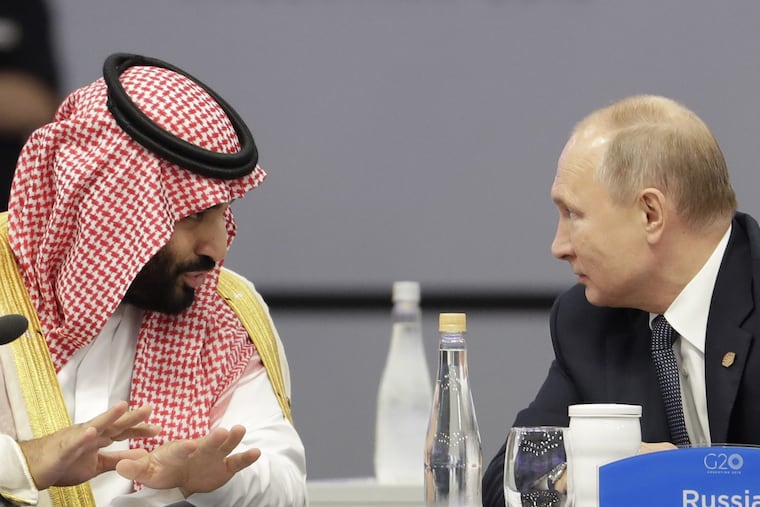Saudi women activists jailed and tortured. Still, Trump supports Mohammed bin Salman | Trudy Rubin
As MBS tries to restore his reformer image at G20 after Khashoggi affair, Human Rights Watch says Saudi women activists are being tortured in prison.

Saudi Crown Prince Mohammed bin Salman (known as MBS) is eager to restore his reformer image after the CIA, and most of the world, has concluded he ordered the killing of Saudi journalist Jamal Khashoggi.
President Trump is eagerly trying to aid the prince, disputing the CIA's conclusion and refusing to let CIA Director Gina Haspel testify to the Senate on this revolting affair. But if you need any more warnings about the reckless temperament of the Saudi to whom Trump has hitched his entire Mideast policy, consider this:
As part of his campaign to squash any dissent, even from moderates who support the monarchy, MBS has presided over the jailing of 18 women's rights activists this year. They include the best-known campaigners for Saudi women's right to drive, such as the courageous Loujain al-Hathloul. Several of the women have allegedly been tortured, according to Human Rights Watch and the Wall Street Journal, with electric shocks and lashings. At least one has been sexually assaulted, says the Journal, and one has attempted suicide.
"Under MBS, the crackdown has been unprecedented in modern Saudi society," says Michael Page, deputy Middle East director at Human Rights Watch. "This treatment of women tells us this image we've been sold in the West of MBS as a reformer is a fraud."
Yet MBS is receiving unstinting White House support.
The crown prince waltzed around the Group of 20 industrial nations meeting in Buenos Aires, grinning and high-fived by Vladimir Putin, and schmoozed on the sidelines by President Trump and Ivanka, that supposed women's rights champion. No word from the First Daughter about the Saudi assault on jailed female activists, nor from her husband, Jared Kushner, a big MBS booster and buddy.
Of course, MBS has already become renowned in his short tenure for his determination to silence perceived critics, targeting businessmen, relatively moderate clerics, intellectuals, and even members of the royal family. The prince's pursuit of Khashoggi typified his paranoia: The journalist had long worked for and supported the royal family and went into exile only when he realized that MBS could not tolerate the slightest criticism.
But MBS's crackdown on these women activists is especially bizarre, given that, in June, he finally lifted the Saudi ban on women driving – the only such ban in the world.
To better understand the prince's mind-set, I turned to a column written by Khashoggi in May for the Washington Post. "It is appalling to see icons of reform branded as 'traitors' on the front pages of Saudi newspapers," he wrote, in reference to the crackdown on women (and men) who had long championed many of the same social freedoms – including women's right to drive – that the prince supposedly endorsed.
Khashoggi concluded: "These arrests are about controlling the narrative. No independent voice or counter opinion will be allowed." MBS could not tolerate the idea that these women might take credit for the lifting of the driving ban, or push for further freedoms for women. So it labeled the women traitors for speaking to foreign media about social change.
Who are some of these "traitors"? Iman al-Nafjan is a mother of three and former blogger for Amnesty International who was one of the leading campaigners for women's right to drive. Aziza al-Yousef is a 60-year-old professor at Riyadh's King Saud University.
And then there is Hathloul, 29, who became the face of the driving movement in 2014 when she drove from the United Arab Emirates toward Saudi Arabia, live-streaming her journey. She was arrested at the Saudi border and spent 73 days in jail.
>> READ MORE: Jamal Khashoggi isn't the only journalist murdered for his principles | Trudy Rubin
The indomitable Hathloul was kidnapped in March while driving in Abu Dhabi, where she had been studying, forcibly returned to Saudi Arabia, and banned from posting on social media. In May, she was arrested and branded a "traitor." Her husband was kidnapped from a hotel room in Jordan and returned to Saudi Arabia, according to the Washington Post.
According to the Wall Street Journal, the central official in the campaign vs. women's-rights activists is none other than MBS's right-hand man, Saud al-Qahtani, the same man accused by U.S. officials of playing a key role in the operation that killed Khashoggi. The U.S. Treasury has sanctioned Qahtani, and he has supposedly been fired, but he is still continuing as a key adviser to MBS.
The issue here is not the U.S.-Saudi alliance. but rather Trump's reliance on a reckless prince, which will continue to backfire. Every aspect of American foreign interests that MBS has touched has failed, from his kidnapping of the Lebanese prime minister, to his failure to godfather an Israeli-Palestinian peace, to the misbegotten Yemen war into which he dragged the United States.
The White House is clearly eager to whitewash the CIA's conclusions about the murder of Khashoggi . But the reports of torture of jailed Saudi women send warning signals so blinding they must not be ignored.